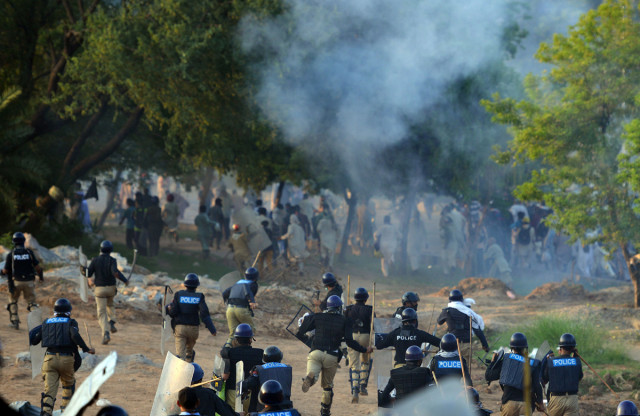Game of Losers
The incompetence and immaturity of our political cadre stood exposed.


The protesters used a truck to breach the gates of parliament but the police lines held amidst clouds of tear-gas, there was no discharge of live rounds, and by midday on the 31st the casualty list was three confirmed dead and anywhere between 300 and 500 wounded, mostly with injuries unlikely to prove fatal. There were some synchronized protests in Karachi and Lahore but the rest of the country remained peaceful for the most part, and the called-for popular uprising never materialised. Far from flocking to the revolution, the numbers of protesters dwindled as the night wore on.
The political protagonists remained obdurate and it appears that the seventh round of talks between the government and Imran Khan and Dr Qadri were deemed a failure. The protesters had failed to dislodge the Nawaz Sharif government, and they had failed to ignite any national desire for the ouster of the incumbents that translated into spontaneous action. The government had failed to provide national leadership and the PM appeared to be little more than a mute glum cypher. His government had appeared leaden-footed and slow to grasp or manage the evolving confrontation.
The involvement of the army as an honest broker between the government and those seeking its downfall, was clumsily handled and quickly deteriorated into an argument about semantics. It was also roundly condemned by politicians of all parties, particularly as the PM had so publicly reposed his confidence in the ability of parliament to resolve the crisis. Even if he survives to fight another day Nawaz Sharif is seriously weakened, and unlikely to play much of a role in shaping foreign policy or managing the relationship with India, both now reportedly in the hands of the military.
Imran Khan and Dr Qadri had painted themselves into their respective corners. Dr Qadri is not a mainstream political figure and may melt away as he did two years ago, but Imran Khan leads the third largest party in Parliament, and he has some hard questions to answer not least from his own MNAs and party office holders. His decision to order the protesters to march on the PM house and cross the ‘Red Line’ was said by Javed Hashmi to have been made after Imran Khan received a messages. The content of the messages were not revealed; but very soon after Imran Khan made a unilateral decision to move his troops – against what he had agreed with his own Core Committee. Within the hour the Battle of D-Chowk was joined.
It was covered by the media who became casualties themselves as they were brutally attacked by the police several times, and PTI supporters attacked the offices of a media house; but the most gravely wounded at the end of the day was Pakistan. The incompetence and immaturity of our political cadre stood exposed. Billions have been lost in revenue. It may take years to recover and the Battle of D Chowk is not over yet.
Published in The Express Tribune, September 1st, 2014.
Like Opinion & Editorial on Facebook, follow @ETOpEd on Twitter to receive all updates on all our daily pieces.















COMMENTS
Comments are moderated and generally will be posted if they are on-topic and not abusive.
For more information, please see our Comments FAQ